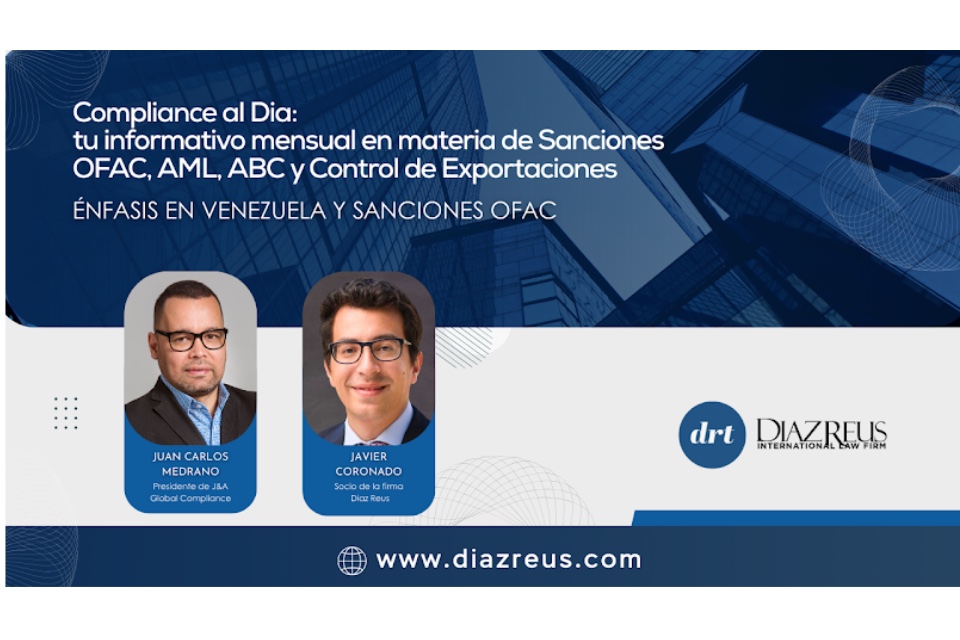Mexico is the second largest economy in Latin America, while the United Arab Emirates (UAE) is the second largest economy on the Gulf peninsula. They share common attributes, two of which are a dry climate and a strategic location for business trade. In the past several years, both countries have increased their efforts to pursue treaties to open new markets for their businesses and investors.
In line with that trend, in 2012 the UAE and Mexico signed a double taxation avoidance treaty and an agreement on reciprocal protection for investment is in the process of being finalized. These treaties are expected to have a tremendous economic impact and strengthen mutual trade relations between the two countries.
Practical Steps to Better Manage Legal Risks Overseas
Companies in the two countries are expected to work immediately to identify key products and services that are, or could be, traded, as well as specific regulatory policies, standards, or practices that affect the cross-border trade. Yet, with all of the potential upside of doing trade deals, there are also key risks. That is why, when doing cross-border trade, all parties must understand and closely manage the potential legal risks to determine their best approach.
- Select the right local partner
- Be careful with contracts
- Be mindful of employment matters
- Educate and train employees
- Engage experienced legal counsel
One | Select The Right Local Partner
Choosing the right local partner can mean the difference between having a significant asset or a major liability. The goal of vetting and selecting is to ensure that a partner can not only meet quality and delivery requirements but also comply with regulatory standards. Careful vetting and selecting is even more important in emerging markets as it can be difficult to verify issues like ownership, financial solvency and criminal histories. To overcome these challenges, one should ask potential suppliers and partners whether they have previously done similar work and get references to verify the quality of their work. As a starting point, prospective local partners should be interviewed to get a sense of how they operate and whether they have the capacity to handle the volume and complexity of cross border business procedures.
Two | Be Careful With Contracts
Sometimes parties lock themselves into exclusive relationships to save on price but it is a mistake to give an overseas distributor or partner exclusivity without a real need to do so. The ideal approach is to start small and scale slowly. Most importantly, be aware of the basic ways in which one can manage risk through appropriate contract provisions. A contract provides an opportunity to manage that exposure by limiting the liability that a party would have to the other party under the contract. For example, in a sales contract, a seller may limit its liability to the sale price of the product sold rather than become exposed to much larger damages. Among other things, parties should consider very carefully how disputes under the contract would be resolved—by litigation or arbitration—where they would be resolved and in what forum.
Three | Be Mindful Of Employment Matters
If you hire an employee in a foreign land, it will become subject to the foreign labor laws. This is a complicated area even for domestic companies and any employer needs to understand the basic labor laws applicable to employment issues as hiring, management, incentives and discharge of employees. Unfortunately, this may be a particular risk for companies that have smaller overseas offices since they cannot generally afford the sort of human resources professionals that larger companies have. Smaller offices managed by executives sent from overseas may have the highest risk of making mistakes in this area, where the resulting potential liability can be huge.
Four | Educate And Train Employees
Selecting the right employee to send to the overseas office may be the most important risk- management step. In many cases, legal problems could be directly attributed to employees who were simply not suitable for the job they were sent to the overseas office to do. It makes sense to select employees who are well-suited for the environment in which they will be working and to give such employees the basic training they will need to help them deal with the risks that they can encounter. That will obviously require a considerable investment of time and money.
Five | Engage Experienced Legal Counsel
Finally, when establishing overseas operations it is crucial to have the advice of local counsel experienced with the laws of the foreign country. Licensed legal counsel in the foreign jurisdiction can help you to identify specific risks and offer appropriate counsel on how best to manage those risks even before problems arise.
Diaz Reus has an active cross-border transaction team with offices in both the UAE and Mexico, as well as offices in the U.S., South America, Europe and Asia. Corporate Intl Magazine recently selected founding and global managing partner, Michael Diaz Jr., to receive their Global Award for 2014, ‘Cross Border Attorney of the Year in Florida.’ Should you need counsel or assistance, please call us for more information.













